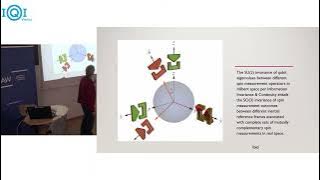Making Sense of Quantum Mechanics Per Its Information-Theoretic Reconstructions

In this talk, I will show how one such principle, Information Invariance & Continuity, at the foundation of those axiomatic reconstructions maps to "no preferred reference frame" (NPRF, aka "the relativity principle") as it pertains to the invariant measurement of Planck's constant h for Stern-Gerlach (SG) spin measurements. This is in exact analogy to the relativity principle as it pertains to the invariant measurement of the speed of light c at the foundation of special relativity (SR). Essentially, quantum information theorists have extended Einstein's use of NPRF from the boost invariance of measurements of c to include the SO(3) invariance of measurements of h between different reference frames of mutually complementary spin measurements via the principle of Information Invariance & Continuity. Consequently, the "mystery" of Bell state entanglement is understood to result from conservation per Information Invariance & Continuity between different reference frames of mutually complementary qubit measurements, and this maps to conservation per NPRF in spacetime. I will show how this "average-only" conservation represented by the Bell states rules out the no-signalling, "superquantum" Popescu-Rohrlich joint probabilities using Bub's "Quasino" guessing game. Thus, the axiomatic reconstructions of QM have succeeded in producing a principle account of QM that is every bit as compelling as the postulates of SR.
Kommentare (0)
Keine Kommentare gefunden!